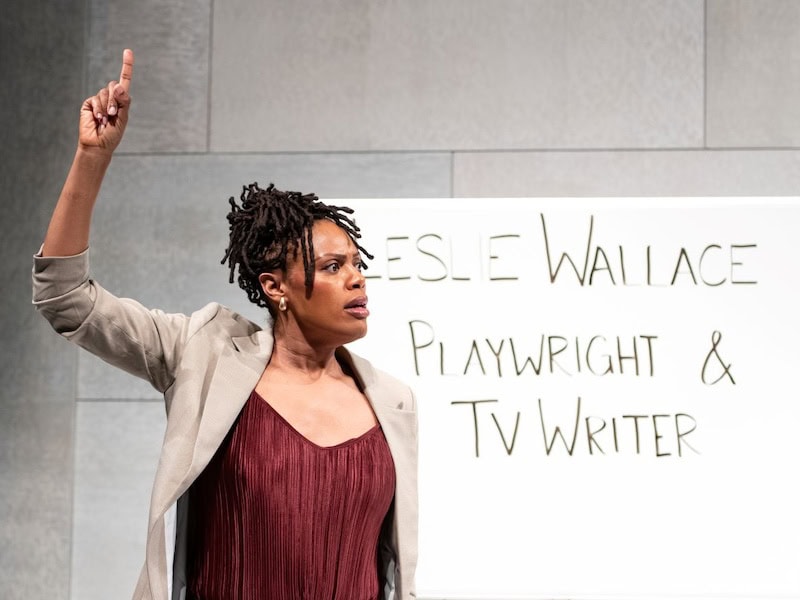A Jumping-Off Point, written by Inda Craig-Galván and directed by Jade King Carroll, centers Black writer Leslie Wallace, played by Nikkole Salter, who has just landed her first deal with HBO to run her own show. Just as she begins celebrating, an old face from her grad school days — a white man named Andrew, played by Danny Gavigan — knocks on her apartment door one day to accuse her of plagiarizing his script. And — it turns out that she actually did.
This setup provokes questions: When each of us exists in a world where economic potential and social power are heavily influenced — and sometimes determined — by ancestry and socially contagious bias, what is fair? Who deserves power? To what degree, and at whose expense? Is wrongdoing to achieve progress always fair, or ever fair? What is just in a world where justice is so often denied to so many?
A Jumping-Off Point from Black playwright Craig-Galván thinks that the mainstream progressive answers to these questions may not be sufficiently nuanced nor ready for the complexity of reality.

As we learn, Leslie’s first draft of her script was almost identical to Andrew’s. Her best friend Miriam, played by Cristina Pitter, is the playwright’s self-insert of sorts: she agrees to meet with Andrew to hear his side and then conveys his take to Leslie. Leslie, meanwhile, essentially remains hostile to Andrew throughout the play, cutting him out of the writers’ room. She makes him an executive producer as a concession but declares that Rule #1 of both their public appearances together and their creative team’s process is “Andrew Does Not Talk.” Andrew is certainly not easy for Leslie to work with: he makes rude requests of Leslie to go fetch him refreshments in her own home and dabbles in off-color arguments like, to paraphrase, “Of course, they’d take the script from you — TV’s not interested in taking scripts from white guys right now.” But much of his rude behavior originates from his frustration over her intellectual property theft. This show asks: when the person of privilege standing in the way of progress is still in Plato’s cave on race issues, what means of achieving that progress are acceptable?
Craig-Galván’s eagerness for a level of nuance and humanity is commendable. In an interview with DCTA earlier this month, playwright Inda Craig-Galván said,
I don’t subscribe to writing good versus bad guys, villains or heroes. I find it more interesting and believable to write characters as human, caught in the same dilemmas and decision points that we all deal with every day. I worked on finding Andrew’s humanity, finding a way to explain his choices, who he is, his journey.
This interest in complexity certainly comes through in moments, but the performances could benefit from this interest as well. Some of Andrew’s mannerisms played by Gavigan, for instance, don’t give these moments time to shine.
Gavigan portrays something of an SNL stereotype of a straight white male, with a comedically limited lack of self-awareness. While there could be benefits in playing the albeit privileged victim of wrongdoing as incredibly unlikable, if the show’s focus is dealing with post-bumper-sticker reality, it is not a place for exaggerated, comedic performances. Plenty of the dialogue provides comic relief without sacrificing the play’s primary tool for mining insight. In Andrew’s scene when he earnestly pleads with a cold Leslie to have any voice in the writers’ room, it is strange to have the character switch from being Michael Kosta’s The Daily Show persona to a three-dimensional centrist or right-of-centrist. And there are ample opportunities for humor without the privileged character being cartoonishly awful. There’s plenty of room to satirize and point out hypocrisy in someone who’s more three-dimensional, and this approach also could do a lot more productive good in a show eager to make you think.

Miriam, the character most comfortable with nuance, is played perfectly by Cristina Pitter, whose acting is least cartoonish, which is foundational for the character who serves as the heart of the show. She starts out as a goofy best friend and something of a sitcom trope to Leslie but turns into a compassionate straight-talker who moves the plot and each character toward even considering some kind of compromise.
In pursuit of the show’s core message, Nikkole Salter feels like a three-dimensional character only in certain respects. She is three-dimensional in terms of her relatability — an extended scene at the show’s beginning shows her drinking wine and cracking jokes with Miriam — but seems hell-bent on keeping Andrew out to an exaggerated, cartoonish extent. It feels unlikely that a character in her position would go so far in keeping Andrew down as to write “Rule 1: Andrew Does Not Talk” on the writers’ room whiteboard. While I understand that in telling fables with messages, some satirical exaggeration is necessary, in a story about nuance, exaggeration is the enemy of effective messaging.

Meanwhile, the set design by Meghan Raham at the aptly named Round House Theatre with its rotating stage was stunning. Its double-sided structure is imposing and pristinely designed, its sleek modernity perfect for both Leslie’s ritzy HBO-funded apartment and her writers’ room. This production looks expensive, with its impressive sets framing both the public and private interactions unfolding on stage seeming to echo the importance of getting these questions right in all spheres.
A Jumping-Off Point is an excellent draft of what it is trying to be. The questions it is asking are some of the most pertinent to our time, and it has made a valiant and largely successful effort. I am eager to see more shows unpack ideas, especially any absolutes, that we may take for granted.
Running Time: 80 minutes with no intermission.
A Jumping-Off Point plays through May 5, 2024, at Round House Theatre, 4545 East-West Highway, Bethesda, MD. For tickets ($46–$83), call the box office at 240-644-1100 or go online. (Learn more about special discounts here, accessibility here, and the Free Play program for students here.)
The playbill for A Jumping-Off Point is online here.
COVID Safety: Round House Theatre no longer requires that audience members wear masks for most performances. However, masks are required for the following performances: April 30 (evening) and May 4 (matinee). Round House’s complete Health and Safety policy is here.
SEE ALSO:
Inda Craig-Galván gets a jump on ‘A Jumping-Off Point’ at Round House (interview by Debbie Minter Jackson, April 10, 2024)





I’m so curious to know what you meant by the character of Andrew being cartoonishly awful? Could you site examples in the production other than when he asks for a glass of water because he refuses to leave before he states his claim he’s kept quiet for five years?
Also, theres a slight yet significant misquote of the play here, the correct line is “Theater isn’t interested in producing white guys right now. I get that. Totally.” And it’s part of why he’s remained quiet for all these years, because he never fancied himself a playwright. It’s only when “TV” came calling Leslie with a showrunnner opportunity that he thought it was time to stand up for himself and he saw an opportunity and could no longer stay quiet about his truth.
Typically I don’t engage with reviews, but your take was so specific and so extreme and to infer that it came from choices or actions of the character in the play without being substantiated or cited, I had to comment. At no point in the play does Andrew act out of privilege, cartoonish or otherwise, but out of an assumed self righteousness as he sees it that’s been fostered via a growing resentment for years. I’m curious to know more about what informed your opinion other than a resemblance to a Daily Show correspondent.
I’m mortified that you’d write my performance off in the way that Inda, Jade, and I tirelessly these past 5 weeks have made it our collective goal to avoid, making Andrew a one dimensional, dismissible entity, lacking any self awareness or nuance. It was my painstaking goal to imbue the character with as much history and life and complicated layers as I could within the boundaries of the script. But if you’ll note, his journey finds him suddenly privileged as an HBO Executive Producer, in rooms he would never have access to and ultimately garners him success with a famous streamer that we, (Inda, Jade, and I) saw as could only provide him with an outsized ego. Hence a different Andrew in the last couple scenes than the one we first meet.
Thanks for your thoughts. I’m sorry to hear that anyone would write me off as a caricature. Devastates me sincerely. But I wholeheartedly agree with your take on the text. This is an important piece, written entirely with nuanced, flawed characters. I’m grateful to be a part of it and mortified if I’ve prohibited its message or enjoyment for you or anyone in any way.